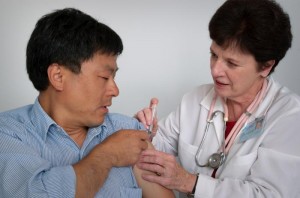Illinois health officials have identified 23 cases of mumps in a local outbreak in Champaign-Urbana, primarily in university students. Local media reports that a Champaign-Urbana Public Health District official said most of the patients had been vaccinated, so the illness hasn’t been severe. However, health officials say the outbreak could grow.

Mumps is a contagious, vaccine-preventable, acute viral illness that is spread through droplets of saliva or through mucus of an infected person. According to the Illinois Department of Public Health (IDPH), symptoms of mumps usually appear 14 days to 18 days after infection. They usually include fever, headache, tiredness, muscle aches, loss of appetite and swelling and tenderness of one or more of the salivary glands, usually the parotid gland (located just below the front of the ear at the angle of the jaw).
In mild cases, the swelling may only last for three to four days, but can last up to a week or more. Approximately one-third of infected people do not exhibit symptoms.
There is no specific treatment for mumps, but there are treatments that can help relieve some symptoms. Persons with symptoms of mumps should contact their primary care physician. Persons that become very ill should seek medical attention. Mumps vaccine is the best way to prevent mumps. This vaccine is included in the combination measles-mumps-rubella (MMR) and measles-mumps-rubella-varicella (MMRV) vaccines.
Children should receive the first dose of mumps-containing vaccine at 12-15 months and the second dose at 4-6 years. All adults born during or after 1957 should have documentation of one dose. Adults at higher risk, such as university students, health care personnel, international travelers and persons with potential mumps outbreak exposure should have documentation of two doses of mumps vaccine or other proof of immunity to mumps.
Simple measures can be carried out to prevent the spread of mumps. Persons who are ill should remain home for five days after onset of salivary gland swelling to help contain the spread of the virus. In addition, make sure to wash your hands, don’t share eating or drinking utensils, clean surfaces that are frequently touched and cover your cough or sneeze with a tissue or your sleeve. Do not cough or sneeze into your hand.


Merck is being sued for allegedly lying about the effectiveness of the Mumps portion of the MMR vaccine. It had to be at least 95% effective in order to be llcensed. So, apparently, Merck fudged the results to make the Mumps vaccine appear to be 95% effective, when in reality it was much less effective. This explains why people who are vaccinated still get Mumps. Too bad that college age students get the mumps, because if a young child gets Mumps, it is a self-limiting illness, but when a teen or adult male gets mumps, it may affect their fertility.
What research is there to support the assertion that cases were mild due to being vaccinated? I have researched vaccines extensively and have NEVER seen any studies comparing severity of cases between vaccinated and unvaccinated people. This is a mere assertion without foundation to make a worthless vaccine appear beneficial when it is not. Sloppy journalism or purposeful misinformation???